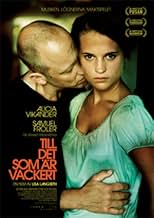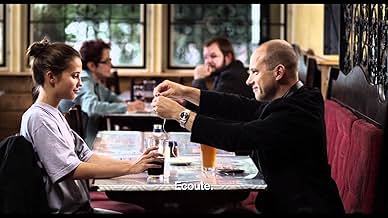CALIFICACIÓN DE IMDb
6.9/10
5.1 k
TU CALIFICACIÓN
Agrega una trama en tu idiomaWith her troubled past, Katarina's life seems to be already set in stone until she discovers music. But the path she has to follow proves a treacherous one filled with lies, betrayal and a d... Leer todoWith her troubled past, Katarina's life seems to be already set in stone until she discovers music. But the path she has to follow proves a treacherous one filled with lies, betrayal and a dangerous liaison with the married conductor Adam.With her troubled past, Katarina's life seems to be already set in stone until she discovers music. But the path she has to follow proves a treacherous one filled with lies, betrayal and a dangerous liaison with the married conductor Adam.
- Premios
- 8 premios ganados y 2 nominaciones en total
Helén Söderqvist Henriksson
- Marissa
- (as Helén Söderqvist)
- …
- Dirección
- Guionista
- Todo el elenco y el equipo
- Producción, taquilla y más en IMDbPro
Opiniones destacadas
Pure (2010)
A stunning performance by young actress Alicia Vikander and intelligent direction (and strong writing) from Lisa Langseth makes this Swedish film a must see.
When 20 year old Katarina finds an escape from her troubled life in a symphony hall, life turns completely around. And she almost keeps up with the change. But her naivite and powerlessness get in her way, as more powerful or misdirected people in the symphony read her signals the wrong way.
That simple set up is all Vikander needs to make her character writhe and shine and fall into despair on screen. It's psychologically tough, beautifully filmed, paced with a sense of importance. I really liked this all around. The story does in ways fall into a familiar power dynamic between older man and younger woman, and so there is by the end something missing there. But other aspects compensate, and Vikander makes small details revelations throughout.
A stunning performance by young actress Alicia Vikander and intelligent direction (and strong writing) from Lisa Langseth makes this Swedish film a must see.
When 20 year old Katarina finds an escape from her troubled life in a symphony hall, life turns completely around. And she almost keeps up with the change. But her naivite and powerlessness get in her way, as more powerful or misdirected people in the symphony read her signals the wrong way.
That simple set up is all Vikander needs to make her character writhe and shine and fall into despair on screen. It's psychologically tough, beautifully filmed, paced with a sense of importance. I really liked this all around. The story does in ways fall into a familiar power dynamic between older man and younger woman, and so there is by the end something missing there. But other aspects compensate, and Vikander makes small details revelations throughout.
PURE ('Till det som är vackert') is a stunning little film from Sweden written and directed by newcomer Lisa Langseth. It is currently in the 'on demand' section of Eurocinema on television and will likely be released on a USA format DVD soon. The film embraces many subjects - coming of age, the impact of classical music on young minds, affaires de coeur, philosophy, the politics of concert halls, mother daughter relationships scarred by mental illness - and in the end succeeds in dealing with some ethical questions.
Katarina (Alicia Vikander, a brilliant, young, fresh 22 year old Swedish actress) lives in poverty with her boyfriend Mattias (Martin Wallström, a handsome, sensitive blue-eyed actor) in an unkempt apartment where Mattias spends his days watching television while Katarina seeks meaning to her grungy life on the streets as a prostitute. Her family is in disarray - her mother Birgitta (Josephine Bauer) is an alcoholic and a mentally ill wasted person - and Katarina is discontent. By chance she hears some Mozart played on the YouTube and has an epiphany moment. She has been a driven, hurt and hopeful soul, but Hearing Mozart somehow changes that. The music draws her to the Gothenburg Symphony Concert Hall where because of some free tickets she and Mattias hear a performance of the Mozart Requiem as conducted by Adam (Samuel Fröler): the experience bores Mattias but transforms Katarina. The concert hall becomes a magnet for Katarina and as she sneaks into the hall for a rehearsal of the Beethoven 3rd she is mistakenly identified by receptionist Nya (Isabella Bauer) as a potential candidate for job in the hall. Katarina's apparent love for music and her openness gain her the position of Concert Hall receptionist: she has escaped her dreary life and is surrounded by classical music. Gradually Katarina meets and becomes friends with Adam who finds her refreshing and in addition to talking about music he introduces her to great literature and philosophy. The bond grows and Katarina and Adam have an affair, a relationship that is transient because Adam is married. When Adam shares with Katarina that the affair must not go on, Katarina is crushed, and because of the fear Adam holds about her omnipresence in the concert hall, he has her fired. The manner in which this abrupt change in Katarina's transformed new life progresses echoes one of the phrases of Kierkegaard the Adam taught her - "Courage is life's only measure' - and the story takes surprising turns and an even more surprising end.
Much of the success of the film is due to the extraordinary acting by Alicia Vikander, a young talent who seems wise beyond her years as far as intuitive acting skills. The musical score is attributed to Per-Erik Winberg, though the music throughout the film is Beethoven, Mozart, Bach and Massenet. In addition to the story being well written and directed and performed, there is a secondary message for the audience: the introduction to classical music and to cultural concepts can change lives of young people if they gain exposure. It is a challenge we should attempt of provide.
Grady Harp
Katarina (Alicia Vikander, a brilliant, young, fresh 22 year old Swedish actress) lives in poverty with her boyfriend Mattias (Martin Wallström, a handsome, sensitive blue-eyed actor) in an unkempt apartment where Mattias spends his days watching television while Katarina seeks meaning to her grungy life on the streets as a prostitute. Her family is in disarray - her mother Birgitta (Josephine Bauer) is an alcoholic and a mentally ill wasted person - and Katarina is discontent. By chance she hears some Mozart played on the YouTube and has an epiphany moment. She has been a driven, hurt and hopeful soul, but Hearing Mozart somehow changes that. The music draws her to the Gothenburg Symphony Concert Hall where because of some free tickets she and Mattias hear a performance of the Mozart Requiem as conducted by Adam (Samuel Fröler): the experience bores Mattias but transforms Katarina. The concert hall becomes a magnet for Katarina and as she sneaks into the hall for a rehearsal of the Beethoven 3rd she is mistakenly identified by receptionist Nya (Isabella Bauer) as a potential candidate for job in the hall. Katarina's apparent love for music and her openness gain her the position of Concert Hall receptionist: she has escaped her dreary life and is surrounded by classical music. Gradually Katarina meets and becomes friends with Adam who finds her refreshing and in addition to talking about music he introduces her to great literature and philosophy. The bond grows and Katarina and Adam have an affair, a relationship that is transient because Adam is married. When Adam shares with Katarina that the affair must not go on, Katarina is crushed, and because of the fear Adam holds about her omnipresence in the concert hall, he has her fired. The manner in which this abrupt change in Katarina's transformed new life progresses echoes one of the phrases of Kierkegaard the Adam taught her - "Courage is life's only measure' - and the story takes surprising turns and an even more surprising end.
Much of the success of the film is due to the extraordinary acting by Alicia Vikander, a young talent who seems wise beyond her years as far as intuitive acting skills. The musical score is attributed to Per-Erik Winberg, though the music throughout the film is Beethoven, Mozart, Bach and Massenet. In addition to the story being well written and directed and performed, there is a secondary message for the audience: the introduction to classical music and to cultural concepts can change lives of young people if they gain exposure. It is a challenge we should attempt of provide.
Grady Harp
Great to see a strong female lead, with full-on anger management issues, as if that were the most natural thing in the world. She's got plenty to be pissed about.
Vikander aces her first full feature. You can see why, her career kicked on from there. But I lean towards the lesser end of the User Reviews.
The music and philosophy props don't seem deeply felt, or played. The ingenue's progression with the older male, you've seen it all before.
How it subverts itself, you haven't seen that too many times. Brava!
Vikander aces her first full feature. You can see why, her career kicked on from there. But I lean towards the lesser end of the User Reviews.
The music and philosophy props don't seem deeply felt, or played. The ingenue's progression with the older male, you've seen it all before.
How it subverts itself, you haven't seen that too many times. Brava!
10jputte
Well, the script might raise some questions at some points but this doesn't really matter. The intensity, the power and credibility of Alicia Vikanders' performance in this movie blows away the story lines. The sober direction of the movie underlines her performance. One of the best performances I've seen in the last years.
The script is touching many subjects such as poverty, coming-to-age and gender issues, without digging deep in any of them. It is the acting which gives the depth of the emotion to this movie. When she is asked to dance in front of the conductor in a most humiliating way, the scene is so painful that the buildup to the climax feels almost logical emotionally. This is not about ethics, but during the movie, you get dragged into the wild emotions of Katarina. And this is to me the essence of the movie: a young wild women fighting her way through a very troubled life. I don't think the director intends to ask our approval or even sympathy, but wants us to take a journey on the emotional roller-coaster of Katarina, so brilliantly performed by Alicia Vikander. Simply breathtaking.
The script is touching many subjects such as poverty, coming-to-age and gender issues, without digging deep in any of them. It is the acting which gives the depth of the emotion to this movie. When she is asked to dance in front of the conductor in a most humiliating way, the scene is so painful that the buildup to the climax feels almost logical emotionally. This is not about ethics, but during the movie, you get dragged into the wild emotions of Katarina. And this is to me the essence of the movie: a young wild women fighting her way through a very troubled life. I don't think the director intends to ask our approval or even sympathy, but wants us to take a journey on the emotional roller-coaster of Katarina, so brilliantly performed by Alicia Vikander. Simply breathtaking.
10gl00637
Things like music, poetry, philosophy etc are essential details of this film, but otherwise have nothing to do with its theme.
That theme is the corruption of innocence. Which puts it in company with other films like "The Go Between", "Rosetta", "Mouchette" or "Lord of the Flies", but "Pure" is realistic rather than romantic. The director, Lisa Langseth, probably has much in common with Anthony Trollope, who was once described as "compared to Trollope, even Balzac is a romantic".
The entire film depends on the performance of Alicia Vikander as Katarina, and that performance is flawless, first as a young girl of passion, through her disillusionment, and, at the very last scene, to her "graduation".
And special mention should be made of Per-Eric Winberg's music soundtrack, both his own compositions and those he selected from other composers are first class.
That theme is the corruption of innocence. Which puts it in company with other films like "The Go Between", "Rosetta", "Mouchette" or "Lord of the Flies", but "Pure" is realistic rather than romantic. The director, Lisa Langseth, probably has much in common with Anthony Trollope, who was once described as "compared to Trollope, even Balzac is a romantic".
The entire film depends on the performance of Alicia Vikander as Katarina, and that performance is flawless, first as a young girl of passion, through her disillusionment, and, at the very last scene, to her "graduation".
And special mention should be made of Per-Eric Winberg's music soundtrack, both his own compositions and those he selected from other composers are first class.
¿Sabías que…?
- TriviaAlicia Vikanders first major role which attracted considerable attention within the film industry.
- ErroresNear the end of the movie, Katarina goes to the library and asks for "Rachmaninoff's piano concerto, with Richter." She finds a seat and plays the CD. The audio is not Rachmaninoff though, but Mozart's Clarinet Concerto in A major (K. 622).
- Bandas sonorasMEDITATION UR THAÏS
Kompositör /Composed by Jules Massenet (1894)
Violinsolist: Christer Thorvaldsson
Göteborgs Symfoniorkester (as Göteborgs Symfoniker)
Dirigent: Neeme Järvi
Selecciones populares
Inicia sesión para calificar y agrega a la lista de videos para obtener recomendaciones personalizadas
- How long is Pure?Con tecnología de Alexa
Detalles
Taquilla
- Presupuesto
- SEK 14,700,000 (estimado)
- Total a nivel mundial
- USD 84,013
- Tiempo de ejecución
- 1h 37min(97 min)
- Color
- Relación de aspecto
- 1.85 : 1
Contribuir a esta página
Sugiere una edición o agrega el contenido que falta

























